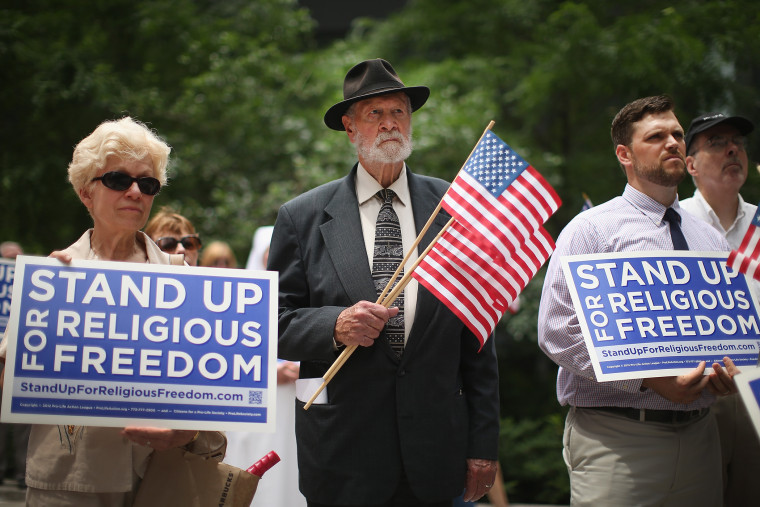In her blistering dissent in Monday’s Supreme Court Burwell v. Hobby Lobby decision, Justice Ruth Bader Ginsburg warned that the court's majority may have “ventured into a minefield” by extending the Religious Freedom and Restoration Act -- a 1993 law that seeks to protect religious liberty from being infringed upon by other federal laws -- to “closely held” companies. Monday's Supreme Court decision allows Hobby Lobby and other privately-controlled companies to exclude birth control coverage in insurance plans provided to employees as required by the Affordable Care Act.
According to Ginsburg, this “minefield” could allow companies to “opt out of any law … they judge incompatible with their sincerely held religious beliefs.”
The very next day, a group of more than a dozen high-profile religious leaders sent a letter to the White House asking for “a religious exemption” -- not to a law, but to President Obama’s forthcoming executive order barring federal contractors from discriminating on the basis of sexual orientation or gender identity.
The letter is addressed directly to the president and was signed by 14 different religious leaders, including Pastor Rick Warren of the Saddleback Church in California, Gabe Lyons of Q Ideas, and Michael Wear, who was the National Faith Vote Director for Obama’s 2012 campaign. Also signing the letter were the heads of organizations like Catholic Charities USA, the Center for Public Justice, Gordon College, and Christianity Today.
The letter states that the signatories respect President Obama’s “commitment to human dignity and justice” and “agree that banning discrimination is a good thing.”
It continues, however, to say that reaching a consensus on every issue may not be possible, and “That is why we are asking that an extension of protection for one group not come at the expense of faith communities whose religious identity and beliefs motivate them to serve those in need.”
As the letter notes, the government often works with religious organizations "to better serve the nation." It is because of those types of partnerships that the religious groups signing on to this letter would be affected by new LGBT employment guidelines for federal contractors.
Some gay rights activists were prepared for the possibility of such a response in the wake of a ruling for Hobby Lobby. Last month, when the White House announced the president’s plan to ban federal contractors from discriminating against gays and lesbians in hiring, GetEQUAL Co-Director Heather Cronk told msnbc that it is “vitally important” for LGBT advocates to insist that the executive order “not include religious exemptions that would permit taxpayer dollars to be spent on discrimination.”
Others in the LGBT community seem less concerned. Fred Sainz, vice president of the Human Rights Campaign, told BuzzFeed he believes the executive order “will contain no further religious exemption other than the very broad one that is in there already.” He then added that there is “nothing in Hobby Lobby to suggest that there should be one.”
Michael Wear, who along with Gabe Lyon wrote the letter asking for a "religious exemption" to Obama's planned executive order, tells msnbc the letter was “in the works” more than a week before the Supreme Court delivered its decision in Burwell v. Hobby Lobby. Wear says the case is “very different” than the exemption being requested.
In their letter, Wear and his co-signers make a case for the religious exemption by pointing to the latest version of the Employment Non-Discrimination Act (ENDA), which passed the Senate last year. The letter states that, without such an exemption, “this expansion of hiring rights will come at an unreasonable cost to the common good, national unity and religious freedom.”
So far, the White House is not releasing any specifics about what language the president’s executive order will eventually include.
